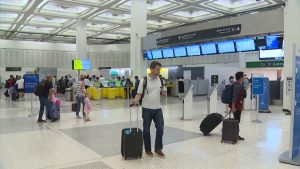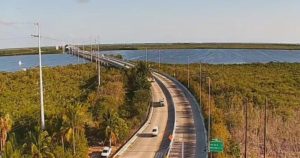Published on August 19, 2025
By: Rana Pratap
Washington County is set to join Delaware, Savannah, Manatee, Teton, Houston, and numerous other jurisdictions by enacting a modest increase in the tourist tax—an adjustment aimed at having transient guests, rather than permanent residents, underwrite the cost of rapid tourism growth and the attendant infrastructural strain. The tax will rise from an existing level of 3 percent to a uniform 5 percent, a decision that synchronises the county’s levies with those of near-proximate and competing destinations, thereby preserving its market edge.
Projections indicate that the resulting revenue stream will be directed, in its entirety, to propelling US tourism by funding multi-channel destination marketing campaigns, maintaining and enhancing parks and public beaches, refurbishing and extending transport networks, augmenting public safety capabilities, and enlarging the functional capacity of high-demography events.
Advertisement
Advertisement
By redirecting the revenues derived from the levies at hotels, recreational-vehicle parks, and short-term rental units, elected leaders contend that the county will, in the immediate term, offset cost pressures surfacing in local fiscal plans, thereby distributing the economic burden of record visitation equitably and in a forward-looking way.
Washington County, Florida
During an August workshop, the Washington County Board of County Commissioners authorized the ballot initiative for a lodging referendum, with a scheduled vote in the November 2026 general election. If the referendum is ratified by the electorate, the levy, effectively a tourist tax assessed on lodging, will rise from 3 percent to 5 percent, the maximum permitted by Florida statute. The assessment is levied solely on transient accommodations, defined to include hotels, RV parks, campgrounds, and short-term rentals transacted through platforms such as Airbnb for stays of fewer than six months, guaranteeing that the financial responsibility for expansion of the tourism sector is borne by visiting rather than resident populations.
Proponents emphasize that only overnight guests will incur the charge unless residents themselves seek short-term lodging, a nuance that often eluded voters during a 2023 referendum that did not succeed. Washington County Tourist Development Council Executive Director Heather Lopez clarified that the incremental levy will sustain strategic marketing initiatives, while TDC Chair Ted Everett observed that the county continues to experience expanding recreational traffic at sites such as Seacrest Wolf Preserve and Falling Waters State Park. In 2023, visitor expenditures generated $26.6 million in economic activity, sustained 380 jobs, and produced $2.5 million in local tax receipts.
Delaware County, Pennsylvania
Delaware County’s Council is preparing for a substantial rise in the transient occupancy tax, proposing a jump from 3% to 5%, effective January 2026. Council projections estimate that the increase will approximately double the current lodging tax receipts, generating nearly $6 million annually. The proceeds are earmarked for bolstering tourism marketing and upgrading infrastructure ahead of marquee events, namely the FIFA World Cup 2026 group matches at Philadelphia and the PGA Championship at Aronimink Golf Club.
County officials assert that the revised percentage preserves the county’s pricing advantage relative to neighboring jurisdictions, including Philadelphia, where the tax is already higher. The Council has also indicated that the expanded rate will encompass hosting platforms such as Airbnb and VRBO, broadening the tax base and ensuring that more overnight guests contribute to the revenue stream.
Savannah (Chatham County), Georgia
Savannah implemented a 2-percentage-point increase in its hotel-motel tax—raising the rate from 6% to 8%—on May 2023, one of the highest percentage raises across the Southeast during this period. The elevation is projected to yield an additional $15 million per year, with the proceeds directed to Visit Savannah, the Savannah Convention Center operating budget, and other tourism-related capital and operating expenses.
City officials defended the rise by citing rapid growth in visitor numbers—Savannah welcomed nearly 17 million visitors in 2022, who in turn generated more than $4.4 billion in local economic impact. Administration representatives contend that the incremental revenue will ensure that tourism-generated tax receipts are reinvested in the preservation and enhancement of the city’s historic fabric and visitor amenities.
Manatee County, Florida
Manatee County’s lodging tax inched to 6% in 2024, the ceiling allowable by state law. Proceeds funnel into an array of tourist-servicing priorities ranging from replenishing sugary beach sand to financing cultural institutions and advertising the region.
County estimates peg the incremental yield at $2.5 million each year. The treasury regards these proceeds as vital to preserving the county’s competitiveness as a sought-after Gulf Coast retreat. Sustained upticks in hotel occupancy and record sudden surges in short-rental bookings have convinced regulators that the uptick safeguards the corridors, sand, and planning that park and pamper visitors.
Teton County, Wyoming
Teton County’s Board of Commissioners has invoked a November 2025 special election to gauge public appetite for a 2% lodging tax supplement to the 5% state cap on hotel and short-term-leasing revenues. Revenue from the proposed hike is earmarked as follows: 60% for tourism marketing, 30% for visitor impact programs, principally expanded trails and sanitation, and 10% for the county’s general treasury.
Relentless tourism expansion in the Jackson Hole corridor has invited millions to Grand Teton and YYNP, a dynamic that has saturated the housing stock, clogged the highways, and stretched public agencies thin. County leaders now contend that the extra visitor-derived revenue is needed both to repair and to recalibrate the costly visitor footprint without further diminishing the day-to-day wellbeing of the county’s year-round families.
Houston County, Alabama
Houston County has announced a proposed 1% lodging tax referendum for the November 2025 general election. Dissimilar to comparable measures adopted in other counties, the proceeds of this tax will be dedicated chiefly to parks, recreational facilities, and other community enhancement initiatives.
County officials contend that an incremental tax of this magnitude will scarcely discourage visitors but will furnish essential resources for the upkeep of public infrastructure. Annual revenues are projected to reach several hundred thousand dollars, with all funds proceeding directly to improvements designed to elevate recreational opportunities for both residents and tourists.
Western Momentum: Colorado and Oregon
Grand County, Colorado
In November 2024, Grand County residents ratified a modest increase in the lodging tax, raising the overall rate from 1.8% to 2%. Despite its superficiality, the amendment constitutes a landmark implementation of Colorado’s revised lodging-tax statute (House Bill 25-1247). Statutorily, at least half of the new revenue will underwrite programs designed to market the region to visitors, while the remaining balance will be allocated to housing and childcare initiatives benefiting employees within the tourism economy.
Park County, Colorado
Park County commissioners are preparing a referendum for the November 2025 ballot that would elevate the lodging tax from its present rate of 2% to 6%. Should residents grant the increase, the 6% levy will take effect on January 1, 2026. Planned expenditures of the increased revenue will encompass the maintenance and enhancement of roads, bridges, and emergency services that principally serve visitors, in addition to continued destination marketing.
Gilpin County, Colorado
Gilpin County is scheduling a 2025 ballot initiative in its unincorporated territories, seeking to elevate the lodging rate from 2% to a maximum 6%. Proponents assert the tax will yield ongoing funding for transportation, utilities, and the stewardship of visitor impacts.
Tillamook County, Oregon
Tillamook County has enacted what is among the nation’s sharpest room tax increases. Effective September 1, 2025, the levy will advance from 10% to 12% and then to 14% twelve months later. Distributions allocate 70% to visitor-serving infrastructure and the remainder to safety and response operations. The gradual increases are intended to mitigate the fiscal tension between visitor growth and the mounting expenses of coastal public services.
Washington County is set to join Delaware, Savannah, Manatee, Teton, Houston and more counties in raising tourist taxes to make visitors, not residents, pay for the rising costs of tourism growth. Officials say the extra revenue will boost marketing, strengthen infrastructure, and keep destinations competitive as travel demand surges nationwide.
A National Trend
Local executives from coast to coast view occupancy levies as dependable funding that redistributes the cost of tourism from residents to guests. The revenue is routinely characterized as vital for promotional campaigns, the upkeep of public assets, the expansion of lodging and safety capacities, and the funding of emergency services essential to serve the visitor population.
Washington County is now aligned with Delaware, Savannah, Manatee, Teton, Houston, and several western counties by enacting recent policy changes. Collectively, these jurisdictions are reimagining the mechanisms through which local governments underwrite tourism, while also addressing the reciprocal strains imposed by visitation. The goal is to make certain that continued growth yields tangible advantages for local inhabitants, while at the same time upholding the integrity of the nation’s most frequented destinations.
Advertisement
Tags: Tourism news, Tourist tax, US, Washington
Advertisement
Tags: Tourism news, Tourist tax, US, Washington
I want to receive travel news and trade event update from Travel And Tour World. I have read Travel And Tour World’sPrivacy Notice.
Wednesday, August 20, 2025
Wednesday, August 20, 2025
Wednesday, August 20, 2025
Wednesday, August 20, 2025
Wednesday, August 20, 2025
Wednesday, August 20, 2025
Wednesday, August 20, 2025
Wednesday, August 20, 2025




